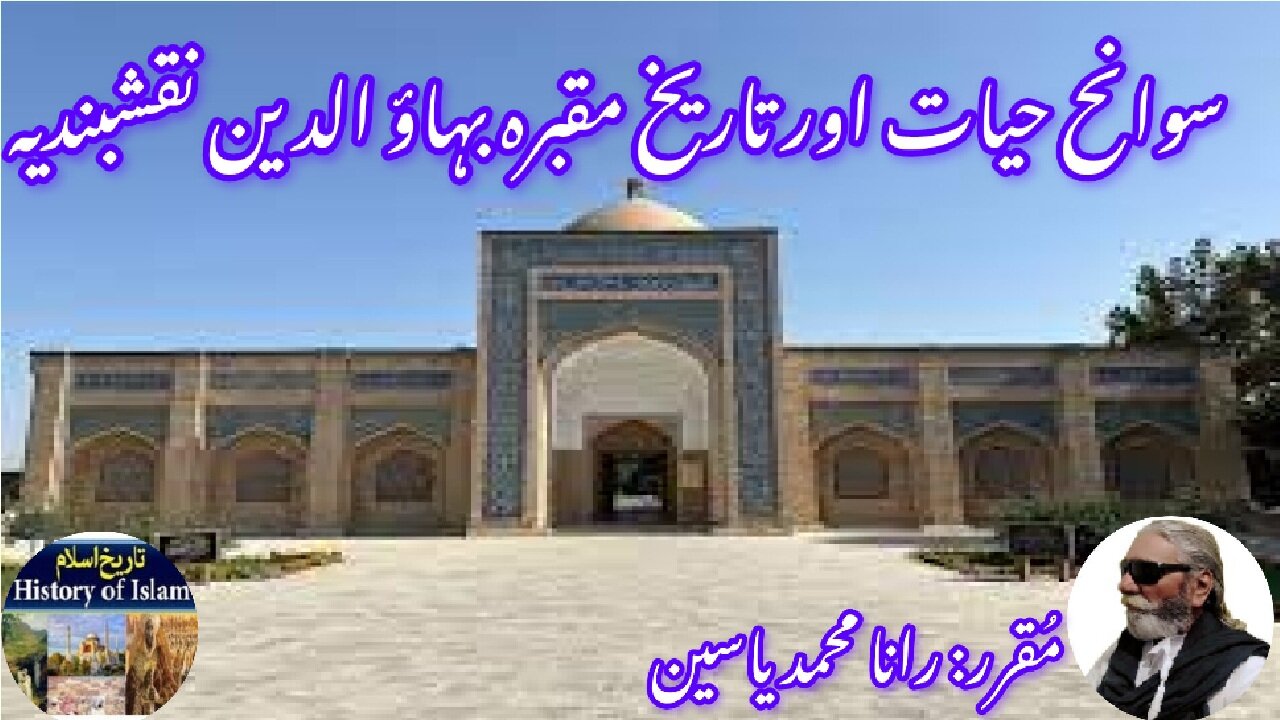Premium Only Content

Bahaal-Din Naqshband बहल-दीन नक्शबंदاسلامی اسکالر بہال الدین نقشبند کی سوانح حیات اورمزار کی تاریخ
@islamichistory813 #sufisaint #culturalheritage #Bahaaldin #naqshband #islamicmysticism #islamicphilosophy #shrine #historicalfigures
Biography of Islamic Scholar Baha' al-Din Naqshband and the history of his shrine
Dekhti Aankhooon aur sountay kaanoon ko Asslamoalaikum, Assalamu Alaikum, sisters, brothers and elders, today in the informative videos of the holiest places of Islam, Islamic Sufi elders, scholars, we are describing the biography of Baha' al-Din Naqshband and the history of his shrine.
Baha' al-Din Naqshband, a prominent Islamic scholar and the founder of the Naqshbandi order, was born in 1318 in the city of Bukhara, which is now part of modern-day Uzbekistan. At the time of his birth, Bukhara was a significant cultural and intellectual hub in Central Asia, known for its rich history and the flourishing of Islamic thought. The city had been a center of learning and spirituality for centuries, attracting scholars, poets, and mystics from across the Islamic world. Growing up in this vibrant environment profoundly influenced Naqshband's intellectual and spiritual development.
From a young age, Baha' al-Din exhibited a deep curiosity about religion and spirituality. His family belonged to a respected lineage, with his father being a well-known scholar in the region. This familial connection to scholarship provided him with a solid foundation in Islamic teachings. His early education began at home, where he learned the Quran and various Islamic texts. This initial exposure laid the groundwork for his later studies and spiritual journey.
As he matured, Naqshband sought further education, studying under prominent scholars in Bukhara. His thirst for knowledge led him to explore various branches of Islamic thought, including theology, jurisprudence, and Sufism. During this period, he encountered different schools of thought within Islam, which contributed to the development of his unique perspective on spirituality. His commitment to learning and self-improvement became a hallmark of his character.
Baha' al-Din Naqshband's formal education included rigorous studies in the Islamic sciences, encompassing the Quran, Hadith, and various branches of Islamic jurisprudence. He studied under respected scholars who guided him in understanding the depths of Islamic philosophy and spirituality. Notably, his education was not confined to the classroom; he also engaged in discussions and debates with fellow students and scholars, which enriched his understanding and critical thinking.
During his studies, Naqshband developed a keen interest in Sufism, the mystical dimension of Islam. He was drawn to the teachings of Sufi masters who emphasized inner purification, love for God, and the importance of personal experience in the spiritual journey. This interest led him to travel to various centers of Sufism, including Samarkand and Khwarezm, where he encountered influential Sufi figures and absorbed their teachings.
One of the pivotal moments in Naqshband's spiritual development occurred when he met the Sufi master, Sheikh Ahrar, whose teachings profoundly impacted him. Under Sheikh Ahrar's guidance, Naqshband delved deeper into the practice of Sufism, focusing on the significance of the heart's purity and the cultivation of a direct relationship with the Divine. This emphasis on inner transformation became a central theme in his teachings and the foundation of the Naqshbandi order he would later establish.
In the late 14th century, Baha' al-Din Naqshband emerged as a prominent spiritual leader, advocating for a return to the essentials of Islamic spirituality. He founded the Naqshbandi order, which emphasized the importance of inner experience and the direct connection with God. The order derived its name from the Persian word "Naqshband," meaning "the one who engraves," symbolizing the idea of engraving divine qualities onto the heart through meditation and remembrance of God.
The Naqshbandi order distinguished itself from other Sufi orders by emphasizing a structured approach to spiritual practice, incorporating specific methods of remembrance (dhikr) and meditation. Naqshband's teachings stressed the importance of following the Sunna (the practices of the Prophet Muhammad) and living a life aligned with Islamic principles. He encouraged his followers to engage in the world while remaining deeply connected to their spiritual roots.
Baha' al-Din Naqshband's teachings also included a strong emphasis on the concept of "sahib al-zaman," or the "master of the time," suggesting that each era has its spiritual guide. He believed that true spirituality requires alignment with the realities of one’s time while remaining grounded in timeless principles. This approach attracted a diverse following, including scholars, rulers, and common people, all drawn to his vision of an inclusive and practical spirituality.
As the Naqshbandi order gained prominence, Naqshband became a well-respected figure in Central Asia. His teachings resonated not only within the Islamic community but also with rulers and political leaders who sought spiritual guidance in navigating the complexities of their time. His ability to bridge the gap between spirituality and governance established him as a pivotal figure in the sociopolitical landscape of the region.
Baha' al-Din Naqshband passed away in 1389, leaving behind a rich legacy that would shape Sufi thought and practice for centuries. His death marked the end of an era for the Naqshbandi order, but his teachings continued to flourish and evolve through his disciples and followers. He was buried in Bukhara, where his tomb became a site of pilgrimage and reverence for Sufi practitioners and spiritual seekers.
The tomb of Baha' al-Din Naqshband, known as the Naqshbandiya Mausoleum, is an architectural marvel that reflects the significance of his legacy. The mausoleum has been a focal point for pilgrims and admirers who come to pay their respects and seek inspiration from his teachings. Over the centuries, the site has been adorned with intricate decorations, calligraphy, and floral offerings, symbolizing the enduring love and devotion of his followers.
Naqshband's legacy extends beyond his lifetime. The Naqshbandi order grew into one of the most influential Sufi orders in the Islamic world, with branches spreading across Central Asia, the Middle East, and South Asia. His teachings emphasized not only the importance of inner spirituality but also the relevance of social engagement and ethical conduct. The principles he laid down continue to guide countless followers in their spiritual journeys.
The Naqshbandi order’s emphasis on moderation and balance in spiritual practice resonated with individuals seeking a grounded approach to Sufism. Followers are encouraged to live in accordance with Islamic values while maintaining a connection to the spiritual dimensions of their faith. This harmonious integration of spirituality and everyday life has contributed to the order's lasting appeal and influence.
Baha' al-Din Naqshband's contributions to Islamic thought and spirituality hold significant cultural importance, particularly in the context of Sufism. His teachings have inspired a wealth of literature, poetry, and artistic expression that reflects the profound spiritual insights he offered. Many poets and writers have drawn upon Naqshband's ideas, weaving themes of love, devotion, and the search for divine connection into their works.
The Naqshbandi order’s influence extends to various aspects of culture and society, including music, dance, and art. Sufi poetry inspired by Naqshband’s teachings often explores the relationship between the seeker and the Divine, emphasizing themes of longing, love, and unity. This literary tradition has enriched the cultural heritage of the Islamic world, fostering a deeper appreciation for the spiritual dimensions of existence.
The order's emphasis on community and social responsibility has also left a lasting impact on the societies in which it flourished. Naqshbandi leaders often played pivotal roles in promoting education, social welfare, and ethical conduct within their communities. Their commitment to service and engagement with the world reflects the teachings of Baha' al-Din Naqshband, who believed that true spirituality should manifest in acts of compassion and justice.
The tomb of Baha' al-Din Naqshband in Bukhara has become a prominent pilgrimage site for Sufi practitioners and admirers of his teachings. The mausoleum, built in the traditional Islamic architectural style, features intricate tile work and calligraphy that reflect the beauty of Islamic art. Visitors come from far and wide to pay their respects, engage in prayers, and seek spiritual inspiration at this revered site.
The construction of the mausoleum was initiated by his followers, who sought to honor his memory and ensure that his teachings continued to inspire future generations. The site serves not only as a tomb but also as a center for spiritual gatherings, discussions, and celebrations of Naqshband’s life and teachings. Annual events and commemorations are organized at the shrine, attracting spiritual seekers, scholars, and community members who gather to reflect on his legacy.
At the mausoleum, visitors often engage in rituals that reflect the values espoused by Naqshband. These include reciting prayers, engaging in dhikr (remembrance of God), and sharing stories of his teachings and experiences. The shrine fosters a sense of community among visitors, encouraging dialogue and reflection on the relevance of Naqshband’s teachings in contemporary society.
Baha' al-Din Naqshband's life and teachings represent a profound legacy within the Sufi tradition and the broader Islamic world. His commitment to inner spirituality, social justice, and ethical conduct continues to inspire seekers of truth and wisdom. The shrine dedicated to him in Bukhara stands as a testament to his enduring influence, attracting visitors who seek inspiration and guidance from his teachings.
Through his writings, teachings, and the community he fostered, Baha' al-Din Naqshband continues to inspire generations, reminding us of the power of love and the importance of nurturing the inner self on the path to spiritual enlightenment. As a significant figure in Sufism, his contributions will forever remain a cherished part of Islamic heritage, serving as a guiding light for those on their spiritual journeys. His legacy encourages individuals to explore the depths of their souls, cultivate a sincere relationship with the Divine, and embody the values of compassion and understanding in their lives.
With that, please allow us until tomorrow, tomorrow we will be described biography of Islamic Scholar Sufi Sanit Balam Sultan and the history of his shrine.
===================
-
 15:39
15:39
ISLAMIC HISTORY
1 day agoIslamic History Episode 116 Attack on Constantinople कॉन्स्टेंटिनोपल पर हमला قسطنطنیہ پر حملہ
2 -
 LIVE
LIVE
Russell Brand
2 hours agoPizzagate Watch Along - SF591
15,384 watching -
 LIVE
LIVE
Bitcoin Magazine
1 day agoThe Bitcoin Conference 2025 | Day 2 Livestream
1,211 watching -
 LIVE
LIVE
Sean Unpaved
2 hours agoPlayoffs, Putts, & Pittsburgh: Breaking Down NCAA Seeding, NBA Heat, & Steelers' QB Call
558 watching -
 8:39
8:39
Matt Kohrs
46 minutes agoThe Future of Bitcoin || The MK Show
481 -
 1:04:21
1:04:21
Timcast
2 hours agoDemocrats NEW CON, Tapper Claims Biden SCANDAL Bad As WATERGATE, Feigns Ignorance
100K40 -
 1:59:20
1:59:20
Steven Crowder
4 hours ago🔴 Trump vs. Harvard: Why The President is Right to Go After This Anti-American University
275K175 -
 LIVE
LIVE
Rebel News
1 hour agoCarney & King's throne speech, Trump's Golden Dome 51st state pitch, Rebel catch Liberal MPs
466 watching -
 LIVE
LIVE
IrishBreakdown
2 hours agoNotre Dame Football Buy/Sell/Hold
89 watching -
 LIVE
LIVE
The Tom Renz Show
1 hour agoChild Abuse! A Doctor Speaks Out About Transitioning Kids
166 watching